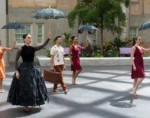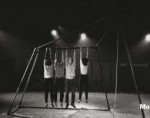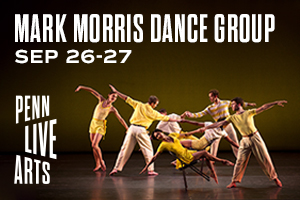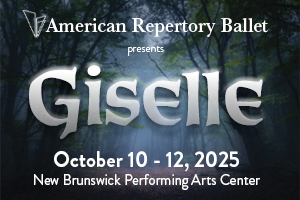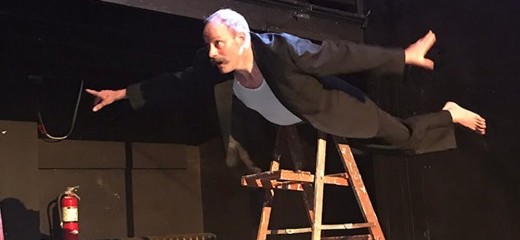
After the Fall
by Andrew Sargus Klein
The story of Icarus is about as memorable as they come: hubris, melted wax, death. As a performance title, then, The Education of Icarus is rooted in familiarity. From familiarity comes expectation; with expectation, fertile ground for subversion. It is a simple narrative scaffold—easily too simple in the wrong hands. In this solo performance, Peter Redgrave neither subverts the myth of Icarus nor does he retell it, but by recombining the expected in small and surprising ways, something unfamiliar and deeply affecting emerges.
A bare retelling of the myth in the program concludes: “Daedalus remains to sort out life without his son.” Is this prologue or synopsis? The answer all but predetermines the subsequent experience. I choose prologue.
Redgrave stands in the center of the small stage at Baltimore’s Mercury Theater, eyes fixed to a point beyond and through us. He is wearing an oversized black tuxedo and a white tank top. The room is silent and cold. Behind him stands a chair; next to the chair, a ladder with a small wooden birdcage at the apex. Each object is filled with expectation. Slowly, weight gathers in Redgrave’s hips and thighs. He is sinking, tense and direct, locked in rapturous attention. His right eye brims and a solitary tear plummets to the ground, as would a body from the sky.
We watch a father watch his son die. Or: I watch a father watch his son die. This is a literal reading. It is my reading. It is not the only reading.
The continued silence amplifies the breaking of heart, of spirit. Now Redgrave is on the floor, dragging his face across the dirty hardwoods and leaving a smear of mucus and tears, as if to fall through the earth itself, grief heavier than gravity.
On his knees, back to us, hands clenched and shaking in a gesture of pain or rage or both. Redgrave now holds a silver singing bowl. He strikes the vessel slowly, at first. Frequency and intensity increase and fluctuate, his knees beat the floor, and his eyes are devoted to this bowl and its singing.
He finds his feet before he entirely finds his balance—it takes a progression of akimbo arms and quick-jerk adjustments before he realizes steadiness. There is humor, here, with Redgrave mugging to the audience in a few discrete moments. The crowd laughs readily. To me, this is disconcerting, as I’m still holding on to the grief of the opening.
Now, the ladder—an old, protesting ladder. With each step, Redgrave buoys nervous expectation. The audience is again ready to laugh, and it does when he mugs again. I am far away from my reading by this point, but that’s okay. It’s clear the narrative isn’t tied to myth or even causality. The structure is less defined, more nonlinear; it’s complexity unfolding gently and purposefully. He is on the last rung before the top, the wood chattering and chirping in a nervous static, an aleatoric texture, small and necessary.
Redgrave doesn’t fall. Instead, he cantilevers himself across the top of the ladder, holds the bird cage in his teeth, and somehow grabs the chair, deposits the cage into the seat, and returns the pair to the floor. It’s a scrambled parody of flight—the symbolism is both obvious and inscrutable—and it is an enchanting example of Redgrave’s alchemical and weird blend of dance, theatre, and performance art. Never quite one or the other, but all three present in craft and execution. This is one of his strongest works to date.
Later, he almost sits on the cage in the chair, and with a start he places it back on the ladder. The cage erupts into mechanical birdsong, an efficient transition as he too erupts with it into a dance of deep and jagged flounderings, heavy footed but quick, throwing his body around in tight arcs within the small space. This is the evening’s brightest moment. This is joy. Redgrave knows this mechanical birdsong so well that he mouths along with it.
Redgrave sits on the chair and returns to that deep stare beyond the audience. With a sudden shift in weight and a ripple of shock across his face, he falls over backwards, arms and legs thrown wide. The son replaces the father; the end returns to the beginning; grief and myth endure.
The Education of Icarus, Peter Redgrave, The Mercury Theater, January 25-29.
By Andrew Sargus Klein
February 17, 2019


